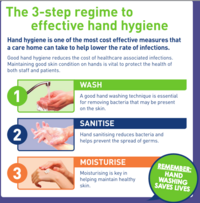 Winter is known as cold and flu season for a good reason. In the chillier months and especially right after the holidays, people become more prone to these illnesses and often end up with a nasty case of the sniffles. It’s a common occurrence because the holidays see people in close confines with others, allowing for the exchange and spreading of germs.
Winter is known as cold and flu season for a good reason. In the chillier months and especially right after the holidays, people become more prone to these illnesses and often end up with a nasty case of the sniffles. It’s a common occurrence because the holidays see people in close confines with others, allowing for the exchange and spreading of germs.
A cold, of course, isn’t exactly serious enough to warrant staying at home curled up in bed for a few days, so many of us continue to go about their daily lives, but there is the issue of infection to consider. Going into work with a cold is a sure fire way to spread the virus and infect everyone you work with and is probably the most common reason any of us get a cold in the first place. What can be done to help ward off these winter illnesses?
The most effective way to reduce the chances of spreading a cold virus or something similar is to maintain a clean environment and body. Your hands, for instance, come into contact with various different things during the day, meaning that you are constantly spreading your germs just by touching: keyboards, door handles, food boards, the list goes on. The chances are that these things you’re touching will be used by other people, so you need to ensure that these things are clean.
The best course of action is to use soap and water to clean any surfaces you come in contact with, particularly in areas that concern food preparation and handling. One of the best ways to reduce risk of illness is to regularly wash your hands, especially after using the toilet or before handling food, but washing them regularly is not always achievable.
Routine and responsibility calls for a more convenient method to keep our hands clean; for example, working at your desk or being out and about means you can’t simply get up and go to wash your hands every time you need to. The best alternative in this case is to use hand sanitisers. Hand sanitisers are cheap and portable, allowing you to clean your hands when you don’t have access to a sink and a soap dispenser. Of course, they shouldn’t be used as a substitute for soap and hot water, but they are an effective and useful tool to make use of. They’re now used regularly in hospital environments and are seen as a good addition to a person’s hygiene routine.
The following three step regime to effective hand hygiene has been designed by Care Shop (click on the image above for a downloadable guide):
- Wash - A good hand washing technique is essential for removing bacteria that may be present on the skin.
- Sanitise - Hand sanitising reduces bacteria and helps prevent the spread of germs.
- Moisturise - Moisturising is key in helping maintain healthy skin.
Colds are an unfortunate and inconvenient part of life, but there are plenty of things that a person can do to reduce their risk of falling ill, starting with their approach to hygiene. Keeping your hands clean is a simple and effective method that can be easily incorporated into a person’s daily routine thanks to the convenience of hand sanitisers.
By Care Shop - leading suppliers of medical products for care homes and hospitals in the UK.